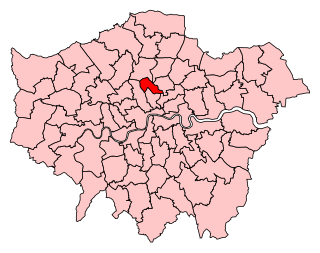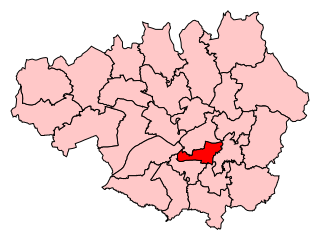Related Research Articles

The House of Commons is the lower house of the Parliament of the United Kingdom. Like the upper house, the House of Lords, it meets in the Palace of Westminster in London, England. The House of Commons is an elected body consisting of 650 members known as members of Parliament (MPs). MPs are elected to represent constituencies by the first-past-the-post system and hold their seats until Parliament is dissolved.

A legislature is an assembly with the authority to make laws for a political entity such as a country, nation or city. They are often contrasted with the executive and judicial powers of government.

First-past-the-post voting is an electoral system wherein voters cast a vote for a single candidate, and the candidate with the most votes wins the election. Analogous systems for multi-winner contests are known as plurality block voting or "block voting" systems; both FPTP and block voting are "plurality" systems in that the winner needs only a plurality of the votes and not an absolute majority. The term first-past-the-post is a metaphor from horse racing of the plurality-voted candidate winning such a race; the electoral system is formally called single-member plurality voting (SMP) when used in single-member districts, and informally called choose-one voting in contrast to ranked voting or score voting.

The Electoral Reform Society (ERS) is an independent campaigning organisation based in the United Kingdom which promotes electoral reform. It seeks to replace first-past-the-post voting with proportional representation, advocating the single transferable vote, and replacing the House of Lords. It is the world's oldest operating organisation concerned with political and electoral reform.

The Political Parties, Elections and Referendums Act 2000 is an Act of Parliament of the United Kingdom that sets out how political parties, elections and referendums are to be regulated in the United Kingdom. It formed an important part of the constitutional reform programme implemented by the 1997 Labour Government, building on the Registration of Political Parties Act 1998 which was passed two years earlier.

The New Zealand Party operated as a political party in New Zealand from 1983 to 1993. Established by millionaire property tycoon Bob Jones, the party promoted economic liberalisation—it was the first political party to promote free market reforms. It failed to win any seats in Parliament, but it purportedly played a role in causing the defeat of Robert Muldoon's National government in the 1984 election by splitting the vote.
Elections in Australia take place periodically to elect the legislature of the Commonwealth of Australia, as well as for each Australian state and territory and for local government councils. Elections in all jurisdictions follow similar principles, although there are minor variations between them. The elections for the Australian Parliament are held under the federal electoral system, which is uniform throughout the country, and the elections for state and territory Parliaments are held under the electoral system of each state and territory.

Islington North is a constituency in Greater London represented in the House of Commons of the UK Parliament since 1983 by Jeremy Corbyn, who was Leader of the Labour Party and Leader of the Opposition from 2015 to 2020.

In the United Kingdom (UK), each of the electoral areas or divisions called constituencies elects one member to the House of Commons.

Manchester Gorton is a constituency represented in the House of Commons of the UK Parliament by Labour's Afzal Khan, who was elected at the 2017 general election. It is the safest Labour seat in Greater Manchester by numerical majority and one of the safest in the country.

In the United Kingdom, a member of parliament (MP) is an individual elected to serve in the House of Commons, the lower house of the Parliament of the United Kingdom.

The Representation of the People Act 1983 is an Act of the Parliament of the United Kingdom. It changed the British electoral process in the following ways:
Owen Gerard Carron is an Irish republican activist who was Member of Parliament (MP) for Fermanagh and South Tyrone from 1981 to 1983.
Huntingdonshire was a Parliamentary constituency covering the county of Huntingdonshire in England. It was represented by two Members of Parliament in the House of Commons of England until 1707, then in the House of Commons of Great Britain from 1707 to 1800, and then in the House of Commons the Parliament of the United Kingdom from 1801 to 1885.
Electors must be on the electoral register in order to vote in elections and referendums in the UK. Electoral registration officers within local authorities have a duty to compile and maintain accurate electoral registers.
The Employee Free Choice Act is the name for several legislative bills on US labor law which have been proposed and sometimes introduced into one or both chambers of the U.S. Congress.
Preselection is the process by which a candidate is selected, usually by a political party, to contest an election for political office. It is also referred to as candidate selection. It is a fundamental function of political parties. The preselection process may involve the party's executive or leader selecting a candidate or be some contested process. In countries that adopt Westminster-style responsible government, preselection is also the first step on the path to a position in the executive. The selected candidate is commonly referred to as the party's endorsed candidate.

There are five types of elections in the United Kingdom: elections to the House of Commons of the United Kingdom, elections to devolved parliaments and assemblies, local elections, mayoral elections, and police and crime commissioner elections. Within each of those categories, there may also be by-elections. Elections are held on Election Day, which is conventionally a Thursday, and under the provisions of the Dissolution and Calling of Parliament Act 2022 the timing of general elections can be held at the discretion of the prime minister during any five-year period. All other types of elections are held after fixed periods, though early elections to the devolved assemblies and parliaments can occur in certain situations. The five electoral systems used are: the single member plurality system (first-past-the-post), the multi-member plurality, the single transferable vote, the additional member system, and the supplementary vote.

The Electoral Registration and Administration Act 2013 is an Act of the Parliament of the United Kingdom which amended electoral law in the United Kingdom. It introduced Individual Electoral Registration (IER).
References
- ↑ Representation of the People Act 1983
- ↑ "UK Legislation". Archived from the original on 2019-09-16. Retrieved 2014-10-26.